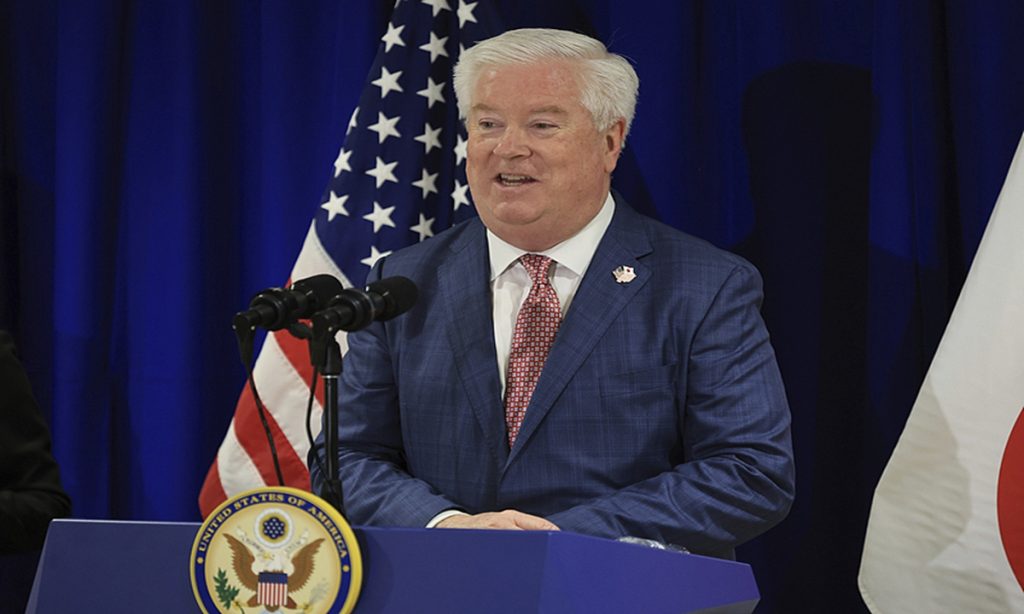Chinese FM responds to new US ambassador to Japan’s agitation of ‘pushing back’ against China

Regarding a media inquiry over the new US Ambassador to Japan who landed in Japan on Friday claimed that the US and Japan need to work together to align their defense forces to "push back against a country like China," Chinese Foreign Ministry Spokesperson Lin Jian responded that the duty of a diplomat is to foster friendly ties between countries rather than vilify other countries, sow discord and stoke confrontation.
China has always been a force for peace, stability and progress in the international community. The world sees very clearly who is flexing muscles, inciting confrontation and threatening peace, Lin said on Friday's routine press briefing.
According to Reuters on Friday, Glass told reporters at Haneda airport that "We sit with Japan in a very tough neighbourhood. You have Russia, you have China, and you have North Korea," claiming that the allies needed to "push back against a country like China."
Xiang Haoyu, a research fellow at the China Institute of International Studies, told the Global Times on Friday that the US' persistent hype of the so-called "China threat" to Japan is a strategic move to bind Japan to its anti-China chariot, in a bid to ease trade frictions between the two countries.
This is not the first time Glass has smeared China. During his previous ambassadorial stint as envoy to Portugal during US president Donald Trump's first term between 2017 and 2021, Glass had warned of China's growing influence in Portugal and criticized Lisbon for allowing Chinese investment in telecommunications and other strategic sectors, Kyodo News reported earlier this month.
But he faced a backlash from Portuguese political leaders after he pressured the European country to choose the US over China or risk the consequences, said the Kyodo News.
Glass, a businessman from Oregon with a background in investment banking and real estate, was confirmed as ambassador to Japan by the US Senate last week.
In addition to the ambassador, US Defense Secretary Pete Hegseth and NATO Secretary General Mark Rutte have also been among those who have hyped the so-called "China threat" during their visits to Japan.
During Rutte's visit, Japan released its annual government foreign policy report, which stressed the importance of Tokyo deepening ties with Washington while also reiterating its policy of promoting a "mutually beneficial relationship based on common strategic interests" with China.
The US is intensifying pressure on Japan in areas such as trade, market access, currency policy, and defense spending, leaving Japan under significant internal pressure and forced into difficult compromises.
At the same time, the current US government's view of alliance relationships as transactional is eroding the strategic trust between the two countries. This has led to hidden cracks beneath the seemingly close Japan-US alliance, exposing increasingly pronounced structural tensions between strategic dependence and national interests, according to Xiang.
Previously, Glass said he was "extremely optimistic" that a deal will be reached between the US and Japan in negotiations over US-imposed tariffs, Kyodo News reported Friday.
However, Japanese Prime Minister Shigeru Ishiba said Monday that Japan will not make compromises for the purpose of quickly concluding upcoming tariff negotiations with the US. "We do not intend to make one compromise after another to conclude negotiations swiftly," Ishiba told a session of the Budget Committee of the House of Representatives, according to the Kyodo News.
"After experiencing a series of recent changes, Japan seems to hold a conflicted mindset toward its relationship with the US," Xiang said. He further noted that despite Japanese companies having already made significant investments in the US, the current US government remains unsatisfied. If Japan is forced to relocate more of its industries, it could face a serious risk of "industrial hollowing-out."
Blindly yielding to US pressure could undermine Japan's economic sovereignty and long-term interests, the expert said, questioning whether Japan would once again repeat the mistakes of the Plaza Accord signed 40 years ago.
"What Japan needs is to strengthen its strategic resolve and its ability to formulate an independent policy toward China," he added.